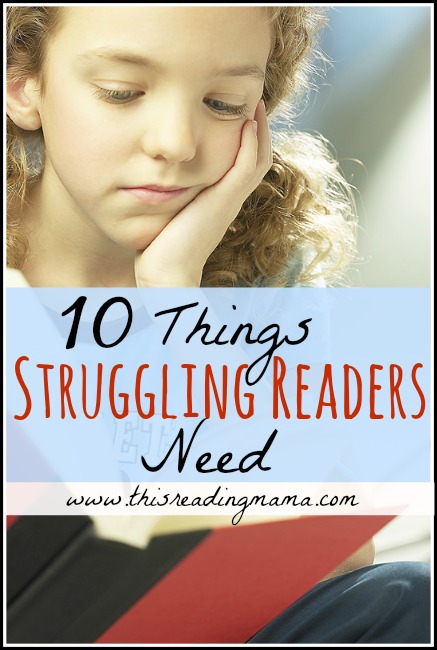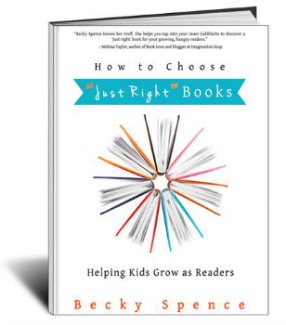
*This post affiliates links. To learn more about this, please read my disclosure policy.
For the next few weeks, I’d like to focus on struggling readers. Struggling readers are a passion of mine. I’ve tutored and taught many of them, from K through 5th grades, and have seen them become confident and capable readers (who actually enjoy reading).
Part of why I love working with them is that I used to be one. I can remember being in the lowest reading group, mispronouncing words while other students giggled, and hating (and I mean HATING) to read out loud, even in high school! The sweaty palms, my heart beating out of my chest, the butterflies raging war in my stomach, serious doubts in my head…the emotional scars of a struggling reader. I can so relate to the students I’ve tutored.
Where do you start with a struggling reader?
When a child is struggling to read, the first thing I do as a tutor is try to pinpoint the root of the reading problem. Is he struggling with basic phonemic & phonological awareness (pre-reading skills), basic phonics skills, other phonics patterns, sight word recognition, fluency, comprehension, or text structure. Perhaps the student is even dealing with other issues such as ADD, difficulty processing, difficult circumstances at home, lack of motivation or self-esteem. These other issues can have a negative impact on reading as well.
As a reading tutor, I gather as much information as I can through a series of assessments and surveys, some of which you can view here.
- parent survey
- teacher survey
- student reading questionnaire
- reading attitude questionnaire
- Primary or Elementary Spelling Inventory (from Words Their Way
)
- phonological or phonemic awareness assessment (for younger students)
- various leveled fiction and non-fiction texts read aloud by the student, followed by comprehension questions
- a listening comprehension assessment done on the student’s actual grade level
It’s quite an extensive assessment…I’d venture to say more extensive than most schools have time to do for individual students. The report I typed up for the parents was usually 12-14 pages long! Needless to say, it was (I am not currently tutoring with 4 young ones at home!) very time consuming. But I thoroughly enjoyed it. It was similar to putting a puzzle together without knowing exactly what the picture would look like. It would take me many, long hours to explain how to do all those assessments, surveys, and questionnaires; so I won’t. What I’d like to zero in on are the teaching practices in regards to reading that are almost universal for all struggling readers. I hope you’ll join me for the next few weeks as we explore these 10 topics {click on each link below}:
Struggling Readers Need… {Click on the links below}
- Specific Reading Encouragement
- Texts They Can Read
- Texts They WANT to Read
- Uninterrupted Blocks of Time to Read (and Re-read)
- To Learn to Read with Fluency
- A Reading Model
- To Develop “Thoughtful Literacy”
- Phonics Instruction That Goes Beyond “Sound it Out” to Reading by Analogy
- To be Supported Before Reading
- To be Exposed to Different Kinds of Texts, Especially Nonfiction
More Struggling Reader Resources:
My ebook, How to Choose “Just Right” Books: Helping Kids Grow as Readers, was written with struggling readers. In it, you will find creative and practical tips for leveling a book, choosing a book for your reader, reading behaviors to listen for as your reader reads aloud, printable checklists and MUCH MORE!
$7.99Add to cart
- What Really Matters for Struggling Readers by Richard Allington
- 5 Days of Multi-Sensory Activities for Teaching Reading
- 5 Days of Text Structure {with FREE printable graphic organizers for Fiction AND Non-Fiction}
- How to Plan for a Reluctant Reader
- Reading Comprehension Strategies Series
- 5 Ways to Improve Reading Comprehension
- Struggling Reader Pinterest Board
~Becky

Another assessment I did was have the students read word lists at different grade levels to see how they could identify words out of context…I meant to include that one in the post.
I look forward to your posts. Reading Rockets is one of my favorite go to resources. The 2000 Reading Panel Report is another resource that made the skills necessary for a child to be an effective reader clear.
Here’ a link to some resources I’ve collected related to teaching a child to read. http://beginningreadinghelp.blogspot.com/p/favorite-reading-resources.html
Thanks for sharing. You’re so organized!
I really appreciate this site and all your knowledge you are sharing. I just made the decision to pull my fourth grader out of school for the rest of the school year because he is very behind on reading and needs lots of one on one help. I feel empowered after reading all these ideas. Thank you!
Thank you for for stopping by to comment. I am so glad the series helped. Enjoy working with your son. 🙂
I also think we move too quickly for students with visual memory and discrimination problems and so spend much more time supporting these skills for that small group of students
Yes, I agree with you. We must remember where our students are developmentally and teach them there instead of pushing them on a frustration level. Great point.
My oldest son was once a struggling reader so I can truly appreciate your advice. Thanks for sharing!!
Wow! I just found this blog through Pinterest. I have a couple of struggling readers but I’m not that concerned as I didn’t read till six grade. But my sisters boy is in a privet school where they do not offer RSP classes or special Ed. And they are not patient nor confident that my nephew will one day be a reader. The teacher was very upset at my sister who is a single mom with a full time job and going to school herself. (She also has a couple of learning challenges as well as dis lexic.) The teacher called a meeting to disipline my sister for my nephews reading struggles. I told her to ask “them” to help him. So they gave him a high school student to help with homework. I also had the opportunity to read one chapter to my nephew one day when he came over and he didn’t comprehend anythin. So I did a lot of hands on work to help him remember. My nephew is required to do a lot of seat work and A Beka curriculum. Lateley my sister has been trying her best to read to her boy (as she also has voice loss which runs in our family.) Anyhow, the privet school teacher just recently threatend my sisters 3rd grade son (my nephew) saying that she would take the high school tutor away if he didn’t perform his school work better. I’m so sad! I sent my sister this link so I hope this blog helps her.
I have just started your series but it is really good so far. My daughter is in 1st grade and is really struggling to read. We try to read with her a lot but I am not sure I am helping in the right way. She does have low self esteem when it comes to reading, maybe that should by focus. I am not a teacher so I feel out of my comfort zone. I need to do some research so I can help her. Thank again.
Hi Tammy. I’m a reading teacher (currently working as a tutor for struggling readers) so let me assure you that if you are reading with her you ARE helping. Learning to read can be a very slow process for some. If she gets frustrated with picture books try poetry- Shel Silverstein is a favorite of my students. Also, talk about the pictures before reading or read the book to her first. Hope this helps!
thisreadingmama, hope you don’t mind that offered my suggestions 🙂
These are very good ideas. A simple way parents can help young or struggling readers develop fluency is to make sure the closed captioning option on their television is always switched on. I wrote about that on my blog here: http://gettingyourkidstoread.com/2015/04/13/cc/
I love your website. please do not delete mrs_wishywashy@hotmail.com. , I love your website and I love Measured Mom as well. They are an excellent resource for me. Keep submitting your wonderful materials.
But I am an adult! Can’t seem to read a book. Troubling.
Thanks
I am a special education teacher that teaches children from Pre-K through fifth. I began four years ago. I found you my first year, and I bought your comprehensive 6 Unit program. I had three boys in one rotation that were able to qualify for the reading accommodation that the reading test could be read to them on the state test. When I did the KTEA assessment, all three when presented with the word DOG and given six pictures could successfully point to the picture of the dog. Your program worked for them. All three of them promoted to middle school as readers! I thank you from the bottom of my heart for all of the support you give to the teaching community.